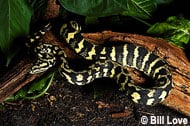Carpet Python
Coastal northeastern (Atherton Tableland) Queensland, Australia.
The vernacular of Atherton Tableland carpet python is frequently used for this snake. Although having the smallest range of any of the several subspecies, the bright colors and small adult size of jungle carpet python has made the snake a hobbyist favorite. Although it may be brown and cream in color, most examples bred by hobbyists are black (or deep brown) and a truly bright yellow. It is the only of the carpet pythons (excluding the diamond python) to be so hued.
Jungle carpet pythons are rather slow moving powerful constrictors that as babies (even captive hatched babies) may strike at an approaching hand and bite, but with just a little bit of growth and some handling this tendency diminishes. This snake often basks quietly by day and is most active in the evening and nighttime hours.
Because carpet pythons are slow and almost methodical in their movements, they can be maintained in terraria smaller that those recommended for many other snakes of similar size. One or two babies may be temporarily housed in a 10 or 15 gallon capacity terrarium. A pair of adults may be kept in a 50 or 75 gallon capacity terrarium.
The terrarium should contain a hide box and assorted visual barriers (such as cork bark or sterilized drift wood). Jungle carpet pythons climb agilely and if provided with firmly anchored limbs of no less diameter that the girth of the snake, they will do so. An elevated platform large enough for the snakes to coil on will also be well utilized. Cypress, fir, aspen chips or bark shards provide an easily cleaned and inexpensively replaced substrate. A temperature of 75 degrees Fahrenheit at night and 82 degrees during the day is ideal for these snakes. A daytime basking spot warmed by an overhead bulb to a temperature of 90 to 95 degrees will be used periodically. A bowl of clean water should always be present and if the receptacle is large enough the pythons may crawl in and soak as they begin their shedding cycle. This python will thrive on a diet of prekilled rodents.
Although the average clutch size is just about half of the maximum clutch size, a large, healthy female Jungle Carpet Python can produce up to 28 eggs in a single clutch. Hatchlings are about 15 inches long.

